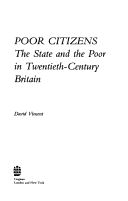Studies In Modern History
1 total work
"Poor Citizens" is an examination of the evolving relationship between different categories of citizenship since 1900. The book begins with related introduction of mass suffrage and mass welfare before and after World War I, and concludes with a discussion of the relations between the poor and the state under Mrs Thatcher. It argues that during the 20th century there has been a significant section of the population who have remained, in a double sense, poor citizens, unable to enjoy a minimum standard of living and at the same time incapable of fully exercising their associated legal and political rights. The analysis describes how these twin failings have been mutually reinforcing. Whilst the growth of the modern democratic state has deeply influenced the experience of poverty since 1900, the relationship between them has been less consistently beneficial than once was hoped. The more the state has distributed in the name of the poor, the more it has denied the poor control over its disbursement.
The poor have been excluded from effective political participation partly by the lack of morale and resources contingent on their position, and partly by their prior and continuing exclusion from the agencies of organized labour which alone could have provided a vehicle for their protests. Lacking the means to give a voice to their political citizenship, they have been exposed to forms of bureaucratic welfare which have denied them the dignity and status essential to their social citizenship.
The poor have been excluded from effective political participation partly by the lack of morale and resources contingent on their position, and partly by their prior and continuing exclusion from the agencies of organized labour which alone could have provided a vehicle for their protests. Lacking the means to give a voice to their political citizenship, they have been exposed to forms of bureaucratic welfare which have denied them the dignity and status essential to their social citizenship.
